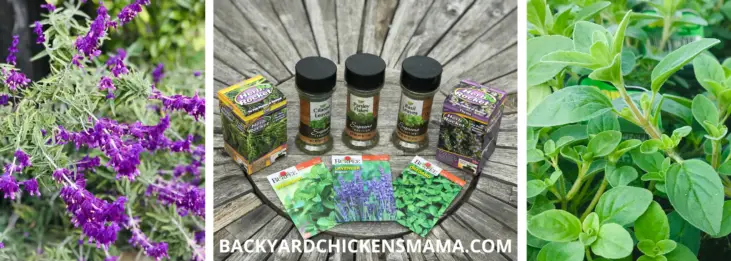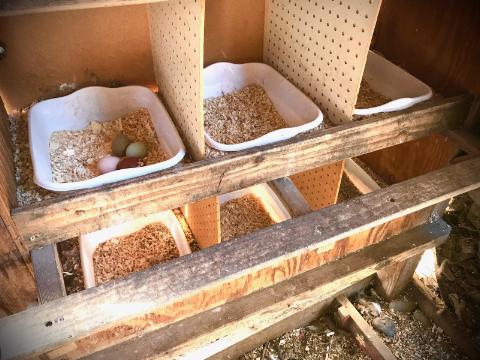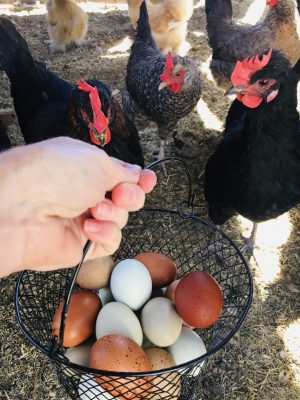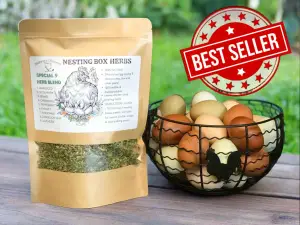
There are a variety of herbs that can be used in and around the chicken coop that can have many health and safety benefits, help boost your hens egg production and not to mention smell good too! Here are 5 important ways to use herbs around your chickens:
- Sprinkle Herbs In Nesting Boxes
- Plant Herbs Around the Perimeter of the Coop
- Scatter Herbs In Coop
- Add Herbs to Chicken Feed
- Sanitize the Chicken Coop

1. Sprinkle Herbs In Nesting Boxes
There are so many benefits to adding fresh or dried herbs to the nesting boxes! They not only can calm your hens, but they will help to deter mites, lice, fleas and other insects and parasites from visiting.
Sprinkling certain natural herbs in the nesting box will also help to increase your hens egg production. It’s crazy, but it does work!
Other herbs have health benefits to your chickens as well.

On top of the health and safety benefits and boost in egg production, it makes your hens’ nesting box smell pretty good too!
For more information on tips the proper set up of your nesting box, read my article Simple Guide to Setting Up the Best Hen Nesting Boxes
Below is a list of the most popular nesting box herbs and the effects they have on your laying hens. There are several different herbs that can create the same effects. You do not need to use all of them to reap the benefits. Just choose which one’s you prefer. I like to pick the one’s that smell the best!
Combine one herb that is an egg laying stimulant, one that is aromatic, one with a calming effect and another that helps to fight insects and bacteria.
| NESTING BOX HERBS | EFFECT |
|---|---|
| LAVENDER | CALMING, AROMATIC/ODOR CONTROL |
| MINT | CALMING, AROMATIC/ODOR CONTROL |
| CHAMOMILE | CALMING |
| LEMON BALM | CALMING, INSECT REPELLENT, AROMATIC/ODOR CONTROL |
| ROSE PEDALS | CALMING, AROMATIC/ODOR CONTROL |
| BASIL | INSECT REPELLENT, AROMATIC/ODOR CONTROL |
| ROSEMARY | AROMATIC/ODOR CONTROL, RESPIRATORY HEALTH, INSECT REPELLENT, ANTIBACTERIAL, ANTI FUNGAL AND ANTISEPTIC |
| FENNEL | BOOSTS EGG PRODUCTION, CALMING |
| PARSLEY | BOOSTS EGG PRODUCTION, CALMING |
| MARGORAM | BOOSTS EGG PRODUCTION |
| MARIGOLDS | BOOSTS EGG PRODUCTION, INSECT REPELLENT |
Lavender, mint, lemon balm, rose petals and chamomile are popular herbs to add to your hens nesting boxes. These herbs will provide a calming effect. Chickens like the calming effects of these herbs and will enjoy rubbing against them and can even safely eat them.
Lemon balm, basil, rosemary and marigolds work great in the nesting box for combating insects such as mites, lice and fleas.
Sprinkle some fennel, parsley, mint, marjoram or marigold herbs into the nesting boxes to help stimulate egg production.

Adding a sprinkle of rosemary in the nesting box will also help to keep the nesting box clean of microbes, bacteria and fungus.
Coops can get pretty smelly if you don’t keep up on chicken poop maintenance. Many of these herbs can also be used as aromatics or odor control both in the nesting boxes and in and around the coop.



Lavender, mint, lemon balm, rose petals and rosemary each have their unique scents and make hanging out with your chickens much more pleasant. Your chickens will like it too!
2. Plant Herbs Around Perimeter of Chicken Coop
Herbs can make excellent rodent and insect repellants as well. Plant some lavender, mint, marigolds, basil, lemon grass, lemon balm, catnip and/or rosemary to help deter insects. Insects such as flies, fleas, mites and lice find the smell of these herbs offensive.


Plant some mint around your chicken coop to help deter rodents. This is especially good at deterring mice and rats from visiting your chickens at night. Supposedly the scent of mint has potent menthol compounds that irritate their nasal cavities. Marigolds also can deter rats and mice and they look nice too!
Planting herbs around the perimeter of your coop can not only make it look nicer, but it will smell good and will help to cut down on the insects and rodents from visiting as frequently.
3. Scatter Herbs in Chicken Coop
Take a handful of fresh or dried lavender, mint, lemon balm, rose petals and scatter them in the chicken coop. This not only will help to deodorize, but it will have a calming effect too.

Hang some fresh lavender or chamomile in the chicken coop or run so when the wind blows through it can fill the air with the nice aroma. Throw some rosemary, basil or marigolds in the chicken coop. It will help to fight fleas, mites and parasites. This is also good to add to their dust bath!
4. Add Dried or Fresh Herbs to Chicken Feed
Chickens go crazy over both fresh and dried herbs. There are many health benefits to offering your chickens a variety of different herbs.
If you let your chickens free range, they will instinctively go for the herbs that their body needs. Herbs contain vitamins and minerals that they do not get in their regular feed. It can help boost their immunity and keep them parasite free!
Add some directly to their regular feed or just scatter it in the chicken run for them to gobble up what they need. Chickens, unlike humans, will only consume what their body needs!



Add fresh or dried rose petals, parsley, oregano, lavender, thyme, mint, basil, garlic, rosemary, lemon balm, dandelion. All of these are edible. All of the herbs that I have mentioned to add to the nesting boxes are also edible.
If you are in question about an herb and if you can feed it to your chicken, look it up. There are several other herbs that are edible that I have not mentioned here.
5. Make a disinfectant spray with the herbs and clean the coop with it.
Did you know you can make natural cleaners that have anti bacterial properties that are safe to use around your chickens? There are several different garden herbs that can be used to make antibacterial sprays for deep cleaning your chicken coop. You may even already be growing some in your garden!
Some herbs have antibacterial benefits, meaning that they kill bacteria or stop new bacteria from growing. Other herbs have antimicrobial benefits, meaning that they will stop the growth of microorganisms, fungi, viruses and bacteria.
Some of the most beneficial herbs for making your own, safe cleaning products for both yourself and your chickens, are rosemary, mint, lavender, thyme and sage.
The more we can get away from using harsh chemicals for cleaning, the better off our environment will be. Why not utilize natural cleaners instead? I have purchased all natural cleaning products through a company called NORWEX. If you are not into growing your own herbs, this company only believes in selling products that have natural and organic ingredients and they do not add any synthetic fragrances to their products.
I highly encourage you to try making your own disinfectant cleaners to use around your chicken coop. You can either grow the herbs yourself in your garden or go to your local garden store and buy some fresh herbs.
Personally, I enjoy growing my own herbs and picking them as I need them. Plus, it just makes me feel good knowing that, “I grew that!”
Recipe for Natural Herbal Disinfectant Spray
Choose which herbs you would like to use for your disinfectant spray. I have found the following 4 herbs to be the most aromatic and are all good at disinfecting, fighting germs.



- Rosemary: antibacterial, anti fungal, antiseptic, aromatic, repels insects and also good for respiratory health.
- Lavender: antibacterial, insect repellent, aromatic
- Mint: antiseptic, anti parasitic, aromatic
- Oregano: antibacterial, antiseptic, anti fungal, anti parasitic, aromatic
Supplies Needed for Herbal Disinfectant Spray
- 1 quart of white vinegar(more if you want to make a larger quantity)
- spray bottles
- large mason jars
- fresh herbs such as mint, lavender, rosemary or oregano
- citrus peels from lemon, oranges, limes
Instructions for Natural Herbal Disinfectant Spray
Step 1: Fill mason jar 1/2 full of your choice of herbs, along with some lemon, orange and/or lime peels. You can experiment with mixing different herbs and citrus peels to see what you like the best!
Step 2: Heat the white vinegar to about 180 degrees. (This will be right before it starts boiling.)
Step 3: Fill the mason jar to just below the top with white vinegar.
Step 4: Place a lid on the jar and set it in a cool location.
Step 5: Let it set for at least 24 hours to let the oils diffuse, giving it a little stir or gentle shake every few hours. The longer you let it set, the stronger the scent will be.
Step 6: Once the mixture is to your desired aroma strength, strain the herbs and citrus peels and pour the remaining liquid into spray bottles.
| EFFECT | HERBS |
|---|---|
| LAYING STIMULANT | FENNEL, PARSLEY, MINT, MARJORAM, GARLIC, MARIGOLDS |
| CALMING | LAVENDER, MINT, FENNEL, CHAMOMILE, LEMON BALM, ROSE PETALS |
| AROMATIC/ODOR CONTROL | LAVENDER, MINT, THYME, BASIL, LEMON BALM, FENNEL, ROSE PETALS, ROSEMARY |
| INSECT REPELLENT | LAVENDER, MINT, MARIGOLDS, BASIL, LEMON GRASS, LEMON BALM, CATNIP, ROSEMARY |
| RODENT REPELLENT | MINT, LEMON BALM, MARIGOLDS |
| ANTI PARASITIC | OREGANO, SAGE, GARLIC, DILL, MINT |
| ANTISEPTIC | BEE BALM, OREGANO, NASTURTIUM, THYME, CHAMOMILE, MINT, ROSEMARY |
| ANTIBACTERIAL | OREGANO, BEE BALM, NASTURTIUM, LEMON BALM, CHAMOMILE, ROSEMARY |
| ANTIOXIDANT | MARIGOLD, DILL, CILANTRO, FENNEL, ROSE PETALS |
| ANTIFUNGAL | CILANTRO, GARLIC, ROSEMARY |
| HELPS COMBAT SALMONELLA | SAGE, OREGANO |
| BOOSTS RESPIRATORY HEALTH | BEE BALM, THYME, DILL, ROSEMARY |
| IMMUNE SUPPORT | OREGANO, BASIL, DANDELION |
| AIDS IN DIGESTIVE HEALTH | BEE BALM, MINT, CHIVES |
| MUCUS MEMBRANE HEALTH | BASIL, MARJORAM, THYME |
| INCREASES BLOOD CIRCULATION | LAVENDER, MARJORAM, GARLIC |
| LOWERS BODY TEMPERATURE | MINT |
What is Poisonous to Chickens?
There are many herbs, plants, trees and vegetables that are toxic to chickens. Chickens are usually pretty keen on what they can and cannot ingest. Sometimes all it takes is one little nibble and it is enough to deter them from eating that plant.
In ordinary circumstances chickens are usually pretty good at staying away from what is poisonous to them. In situations where they have been deprived of food, they are more likely to ingest these herbs and plants that are not ok for them.
Some items, while toxic, if consumed in very small quantities may just be pooped out. For instance, apple seeds contain cyanide. If a chicken eats a few of these, it will most likely just pass them in its poop. I would not recommend offering your chickens apples with the seeds on a routine basis. This can build up in the system and have deadly effects.
Below is a list of the most popular things you may have growing in your garden and what toxic ingredient it possesses.
Table: Garden Plants Poisonous to Chickens
| TOXIC TO CHICKENS | TOXIC INGREDIENT |
|---|---|
| AVOCADO | PERSIN |
| GREEN POTATO SKIN | SOLANINE |
| NIGHTSHADES | ALKALOIDS |
| APPLE SEEDS | CYANIDE |
| CHERRY SEEDS | CYANIDE |
| EGGPLANT LEAVES | SOLANINE |
| RHUBARB LEAVES | OXALIC ACID |
| TOMATO LEAVES | SOLANINE |
| APRICOT PITS AND LEAVES | CYANOGENIC GLYCOSIDES |
| AZALEA | GRAYANOTOXINS |
| UNCOOKED BEANS | HEMAGGLUTININ |
| BULBS | ALKALOIDS |
| FOXGLOVE | DIGITALIS, CARDIAC GLYCOSIDES |
| HOLLY | SAPONINS |
| LOBELIA | PYRIDINE ALKALOIDS |
| LUPINE | QUINOLIZIDINE ALKALOIDS |
| OAK TREE | TANNIC ACID |
| PERIWINKLE | CARDIAC GLYCOSIDES |
| DAFFODILS | LYCORINE |
| MORNING GLORY | LYSERGIC ACID, LYSERGAMIDE, ELYMOCLAVINE, CHANOCLAVINE |
| YEW | TAXINE ALKALOIDS |
| LILY OF THE VALLEY | CARDIAC GLYCOSIDES |
| RHODODENDRON | GRAYANOTOXINS |
| TRUMPET VINE | MULTIPLE NEUROTOXIC ALKALOIDS |
| TANSY | THUJONE |
This list is not a complete list. If you are unsure about an item, look it up. For the most part, chickens seem to know what their body does and does not need. Most poisonous herbs, plants, etc will have a bitter taste to it and chickens will avoid them. But there are some that do not taste bitter and you may just a have that one chicken that decides to eat more than it should of a poisonous item.
Know what you have on your property and if you let your flock free range, observe their behavior around these “no-no” items. If you find that they are wanting to graze on them, you will either need to either remove it or make it so your chickens cannot access it.
Conclusion: Using Specific Herbs Around Your Chickens not only smells much better than the alternative (chicken poop), but can be very beneficial for their health, safety and even boost egg production.
What herbs do you use around your chickens and in what ways are you using them?





Great article. Thanks for the info on all of these herbs. I have been wanting to use herbs in my chicken coop and was wondering which one’s were best!